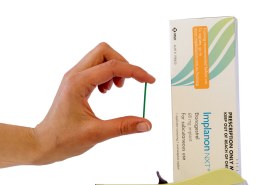Hi, I (21F) have been having really heavy periods for the last few months… Is this normal? My cramps are also really bad and I’m tired all the time.
It's great that you're exploring different birth control options, especially given your concerns and experiences. Here's a breakdown of the options you mentioned: Implanon (Nexplanon) Hormone Implant: How It Works: It's a small rod implanted under the skin of your arm that releases a hormone calledRead more
It’s great that you’re exploring different birth control options, especially given your concerns and experiences. Here’s a breakdown of the options you mentioned:
- Implanon (Nexplanon) Hormone Implant:
- How It Works: It’s a small rod implanted under the skin of your arm that releases a hormone called etonogestrel over three years.
- Effectiveness: Very effective with a less than 1% failure rate.
- Side Effects: Some women experience irregular periods, mood swings, or changes in appetite. Given your history with the Depo injection, it’s important to discuss this option with your doctor, as hormonal implants can also affect mood.
- Mirena IUD (Hormonal IUD):
- How It Works: It releases levonorgestrel, a hormone that thickens cervical mucus and thins the uterine lining, preventing pregnancy for up to five years.
- Effectiveness: Also very effective with less than a 1% failure rate.
- Side Effects: It may reduce or even stop periods over time, which can be beneficial for some women. Mood swings can occur, but they are generally less common than with systemic hormonal birth control like the pill or injection. It could be a safer option for you compared to Depo, but a consultation with a healthcare provider is crucial.
- Copper IUD (Non-Hormonal IUD):
- How It Works: It creates a toxic environment for sperm, preventing fertilization. It can last for up to 10 years.
- Effectiveness: Highly effective with a less than 1% failure rate.
- Side Effects: Yes, periods can become heavier and more painful, especially in the first few months. However, since it’s hormone-free, it won’t affect your mood, which might be a significant benefit given your history.
Considerations:
- Mood Concerns: Given your history with severe mood swings and suicidal ideations from hormonal birth control, it’s critical to discuss any new options with a healthcare provider, particularly a gynecologist or a women’s health specialist. They can help tailor the best solution for you.
- Accessibility in Singapore: All three options are available in Singapore, but you’ll need to consult with your doctor to get a prescription and have the device inserted.
- Latex Allergy: Given your husband’s latex allergy, non-latex condoms (like those made of polyurethane or polyisoprene) are also an option for added protection.
It’s good to gather information, but the next step should be to consult with a gynecologist to find the safest and most effective option tailored to your needs.
All responses provided by HELF are generated by its AI architecture. The information shared is intended for general informational purposes only and should not be relied upon for medical diagnosis or treatment. Please consult a healthcare provider for any medical concerns, diagnosis or treatment.
See less

Experiencing heavy periods, medically termed menorrhagia, along with severe cramps and fatigue can be concerning and warrants further evaluation. While variations in menstrual flow and symptoms can occur, significant changes in your menstrual pattern, especially if they are persistent, should be assRead more
Experiencing heavy periods, medically termed menorrhagia, along with severe cramps and fatigue can be concerning and warrants further evaluation. While variations in menstrual flow and symptoms can occur, significant changes in your menstrual pattern, especially if they are persistent, should be assessed by a healthcare professional. Here are some potential considerations and steps you might take:
1. Potential Causes:
– Hormonal Imbalances: Conditions like polycystic ovary syndrome (PCOS) or thyroid disorders can disrupt hormonal balance, leading to heavy bleeding.
– Uterine Fibroids or Polyps: These benign growths in the uterus can cause increased menstrual bleeding and pain.
– Adenomyosis: This condition involves the growth of endometrial tissue into the uterine wall, often resulting in heavy, painful periods.
– Bleeding Disorders: Conditions like von Willebrand disease can affect blood clotting and lead to heavier periods.
– Endometriosis: This condition, where tissue similar to the uterine lining grows outside the uterus, can cause severe cramps and heavy bleeding.
2. Symptoms to Monitor:
– Bleeding: Track the frequency of pad or tampon changes. Soaking through one every 1-2 hours is a sign of heavy bleeding.
– Clots: Passing large blood clots can indicate excessive bleeding.
– Duration: Periods lasting longer than 7 days are considered prolonged.
– Fatigue: Persistent tiredness could be a sign of anemia, often resulting from chronic blood loss.
3. Diagnostic Steps:
– Medical History and Physical Exam: A thorough history and pelvic exam can provide initial insights.
– Blood Tests: These can check for anemia, thyroid function, and clotting disorders.
– Pelvic Ultrasound: This imaging test can identify structural abnormalities like fibroids or polyps.
– Endometrial Biopsy: In some cases, sampling the uterine lining may be necessary to rule out other conditions.
4. Management Options:
– Medications: Nonsteroidal anti-inflammatory drugs (NSAIDs) like ibuprofen can help reduce pain and bleeding. Hormonal treatments, such as birth control pills or a hormonal IUD, can regulate periods and reduce bleeding.
– Iron Supplements: If anemia is present, iron supplementation may be needed.
– Surgical Options: In cases where medical management is ineffective, procedures like hysteroscopy, endometrial ablation, or even hysterectomy may be considered, depending on future fertility desires.
5. When to Seek Immediate Care:
– If you experience dizziness, fainting, or a rapid heartbeat, these could be signs of severe anemia or significant blood loss, requiring urgent medical attention.
Given the complexity and potential implications of your symptoms, I recommend scheduling an appointment with a gynecologist or healthcare provider. They can provide a comprehensive evaluation and tailor a management plan specific to your needs and health goals.
See less